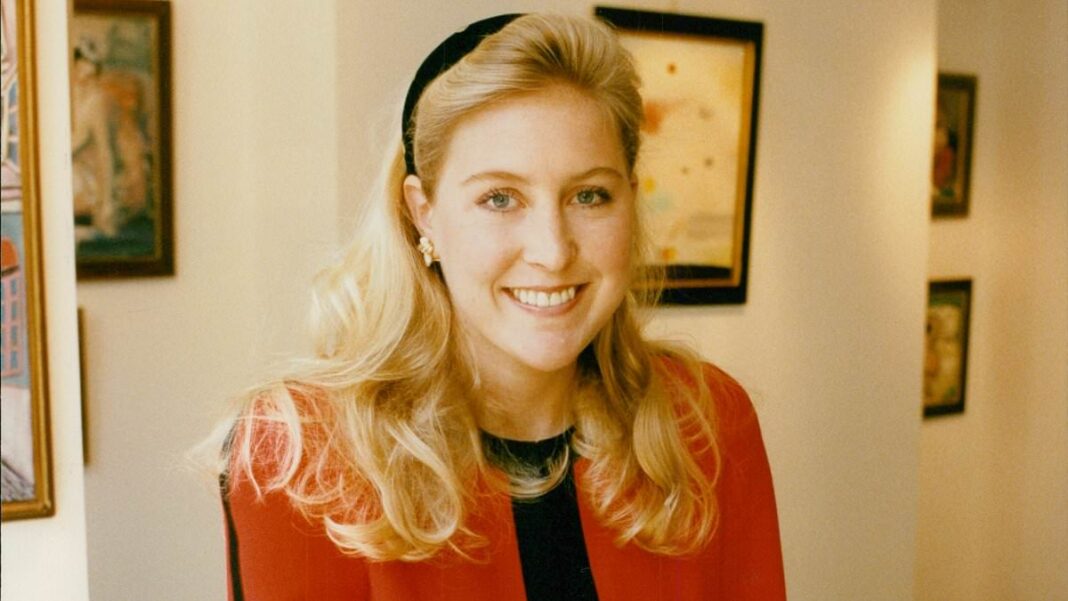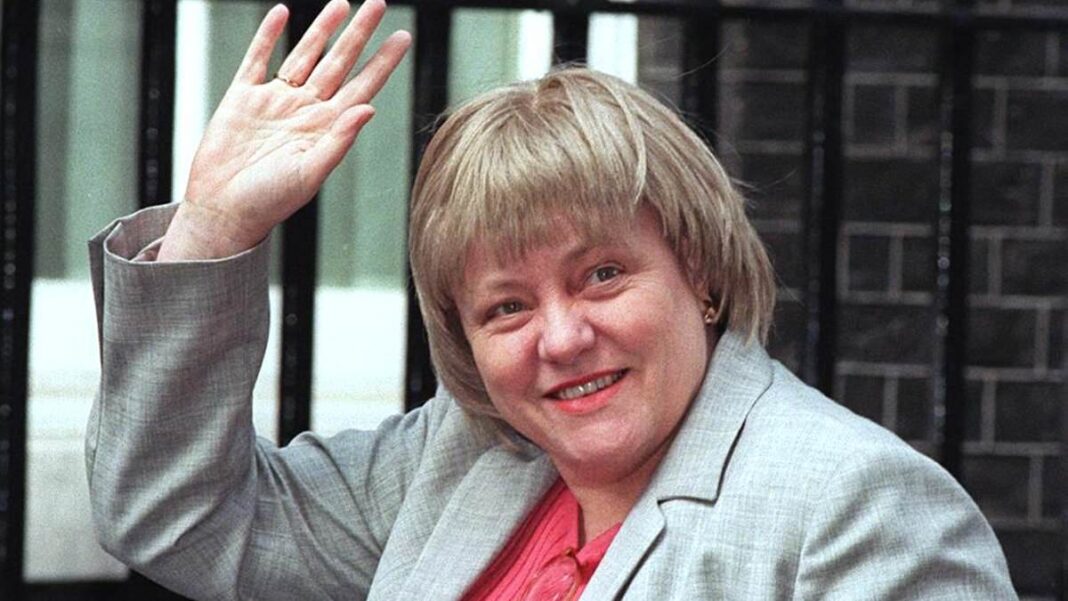As the daughter of the US ambassador, 19-year-old Melissa Price’s life in London was happy, varied and full.
It was the mid-Eighties and she would accompany her father, Charles Price, a trusted friend of the then Prime Minister Margaret Thatcher and US President Ronald Reagan, to functions.
She often attended dinner parties and receptions which her father and mother, Carol, hosted at Winfield House, the ambassador’s official residence set in more than 12 acres of Regent’s Park, central London.
It was at one such gathering that she first met Mohamed Al Fayed, who had recently acquired Harrods, the centrepiece of his desperate campaign to obtain acceptance into British society.
Melissa says: ‘He was sitting on my right at a dinner for 12. At first, I found him chatty and entertaining – yet the truth was that he wasn’t like that at all.’
The truth Melissa would discover some weeks later, when Fayed assaulted her on his yacht after trapping her far off the coast of St Tropez.
She recalls him forcing himself against her from behind and gripping his arms around her so tightly she was ‘unable to move the upper part of my body, constricting my breathing’. He then spat out a series of depraved demands backed with sexual threats.
‘He was trying to rape me,’ she says. ‘It was the first time I had felt in true danger. We were surrounded by miles of black sea, no sight of land.’
One of the worst aspects of her ordeal was that Fayed’s British employees on board the yacht, some of them ex-military, heard her protests but simply turned a blind eye.
Only by biting his arm did she finally escape. ‘It was a primal act of self-defence that tore through the fabric of his Egyptian kaftan,’ says Melissa. ‘He made his intentions clear as to what he was going to do to me and I wasn’t going to let that happen at any cost.’
Melissa has never spoken publicly of those ‘dark, disturbing days’ in September 1986, the fallout from which, involving the most senior figures in the British Establishment, surely crushed Fayed’s hopes of acquiring the British citizenship he craved.
Her failure to check in with her family during the 48 hours she was held in France triggered alarm not just at No10, where her father held an urgent meeting with Mrs Thatcher, but at the White House and CIA headquarters in Langley, Virginia.
Even now, nearly four decades later, Melissa reacts physically when she sees a photo of the Harrods boss. ‘He is a monster,’ she says. ‘Fayed took me against my will. That changed my life and will always be with me.’
The emotional effect of her ordeal on her father, always deeply protective of her, remains vivid in her memory. Widely regarded as one of the most popular and successful American envoys of recent times, he was instrumental in preserving the special relationship between Britain and the US during the Eighties.
Fayed had underestimated the steely persona of the affable-but-tough diplomat from Missouri, whom the media was fond of likening to the movie heroes James Stewart and John Wayne.
Having dined at Winfield House and then seeing nothing wrong in abducting the daughter of his host was typical of what Melissa describes as Fayed’s ‘twisted sense of entitlement’. ‘It convinced him that his status was superior to that of my father,’ she says.
But Melissa says the ambassador was a ‘formidable force to be reckoned with’ and the ‘malevolent ambitions of Fayed to gain British citizenship while assaulting the daughter of a diplomat didn’t stand a chance’.
Before her ordeal, Melissa’s life in London was largely carefree. She was studying the history of art at a London fine arts school. Spirited, fun and hard-working, she had a wide circle of friends.
Soon after their first meeting, Fayed offered Melissa a job at his offices in Park Lane, central London, buying antiques and décor. Although the role was vague, she says: ‘I thought it might be fun.
‘He gave me drawings and plans of his homes and apartments for which he wanted me to buy furnishings. It never occurred to me that he had any other motives in providing me a job.’ But it did strike her as odd that he showered her with cash and gifts.
She adds: ‘He was offended when I tried to refuse them and so I stashed them in a drawer.
‘At the start of a work day while at his office, he said, ‘Do you have your passport with you?’ I told him ‘Yes’. He said, ‘We’re going to Paris today’.’
If she or her father had any inkling that Fayed had predatory tendencies, says Melissa, she never would have worked for him, let alone have gone to France.
She says: ‘In Paris, he took me to his apartment on the Champs-Elysees, and then to The Ritz, where we had a supposed ‘work’ dinner. I felt even more uncomfortable when Fayed arranged for us to sit at a cosy corner banquette, somewhere you’d sit on a date, not with your teenage work assistant.
‘During dinner, he started putting his hands under my skirt and on my legs. He said, ‘You are getting into my bed tonight’. I made it clear that I would not be sleeping with him. Ever.’
That night, the electricity in her room was turned off. She says: ‘The lights went out as my punishment for not sleeping with him. I went looking for a phone to call London to speak to my parents, but one of Fayed’s security guards followed me as soon as I left my room.’
Fayed had also taken her diplomat passport, which she’d asked him many times to give back. ‘I felt like his prisoner in a foreign country with no means of escape,’ says Melissa. The next morning she saw a French girl, ‘no older than 15’, having breakfast in his apartment. Melissa says: ‘She was likely his contingency plan.’
When Fayed told her she was going with him to St Tropez to his yacht, Melissa protested. But he claimed his people had contacted her father’s office and promised to return her to London the next day.
She says: ‘I didn’t believe him, but I had no recourse and had no choice but to accompany him.’
On the yacht, she remembers Middle-Eastern music playing as the Harrods boss demanded sex.
She says: ‘Nothing would have made me want to have sex with this pitiful creature. But I think my belligerence may have enticed him even more.
‘Fayed was wearing a kaftan and trying to come on to me at dinner in an enclosed, airless, tastelessly decorated dining room. I felt verbally raped during hours of being subjected to his depraved descriptions of what he wanted to do to me.
‘He began to get more and more angry and insulted that I didn’t give in to his sickening wishes. Surrendering was not an option.
‘I just wanted to get off the boat. I felt sick, I needed some air. I left the dinner table to go to the deck and Fayed followed me. I saw how far out we were from land. I was stuck on this boat with a sick, vile man nearly the same age as my father. He would have squashed him in seconds if he’d known what he was going to do. Fayed told everyone on deck to go away. This was the first time I had felt in true danger. I was shaking.’
‘I said to him, ‘My father is going to get you if you do something to me. If you hurt me, you’ll be in real trouble’. He tried to belittle my father, boasting that he was superior in position and wealth. He was in fact a coward’.
Pretending to hug her from behind, Fayed pressed himself aggressively against her, clutching her tighter and tighter, locking her into his grip.
‘He held me so tightly, constricting my arms and chest that it was very difficult to breathe. I was physically trapped. Some of the things he wanted to do to me were utterly depraved. It felt like he was trying to rape me through my clothes. At the same time, he was telling me to lie down on the deck. I remember wanting to cry but stopped myself, thinking Fayed might like that.’
Her shouted protests were in vain. ‘The only thing I could use was my mouth,’ she says, ‘so I bit him hard on the upper arm. He screamed out loud. Staff came rushing to his aid but nobody asked me how I was.’
Amid the mayhem, she managed to get away and back to her cabin.
‘I couldn’t turn on the water or the lights. He’d ordered his staff to turn them off. Again, punishing me for defying him. His anger terrified me. He was so mad. I thought he might come in the night and come and get me, maybe kill me.
‘I was locked in my cabin. There was no escape. Next thing, someone was at my door, knocking loudly. It was around 4.30am and still dark. There was a boat to take me to land with two men, his security, and a female member of staff.’
To her horror, the boat that arrived to take her to shore carried ‘a replacement, a girl around the same age as me, pretty, with long blonde hair. We were being swapped, another girl to the slaughterhouse. I realised that Fayed was trafficking women for his twisted desires’.
Much happened behind the scenes that she is still unsure about today, but it is thought Mrs Thatcher intervened. And news of the attack also reached the Queen through a trusted intermediary.
Worried about his daughter, Mr Price went to No10 to seek help from Mrs Thatcher. ‘He didn’t mince his words, she says. ‘He asked her, ‘Help me, I can’t find my daughter’. My father had been calling and calling Park Lane, with people saying they couldn’t find me. They lied for [Fayed].’
Melissa arrived at Heathrow with two of Fayed’s security men. To her relief, her father’s security along with Scotland Yard officers were waiting for her, and at home in London, she was reunited with her distraught parents.
Incredibly, the next day Fayed began sending presents to the house, ‘smoked salmon from his farm in Scotland, an expensive watch for my mother, letters that my parents refused to open’.
Melissa adds: ‘My father wrote a letter for me to sign stating that I wouldn’t be returning to my position with Fayed and for him not to contact me. He insisted on delivering back all the envelopes of cash he’d given me and the gifts’.
Melissa and her father drove to Fayed’s Mayfair headquarters. ‘There were cameras at the front and security guards who watched us return all of it outside Fayed’s apartments, says Melissa. ‘We knew that would have hurt him.’
Months later, Mrs Thatcher hosted a lunch for her. ‘She was so kind. She’s the loveliest, warmest person,’ says Melissa, who now lives in the US. ‘I told her everything that happened including the things he said he wanted to do to me on the boat. She was repulsed and angry.
‘I would like to say that is why he didn’t get his passport.
‘My parents knew how much he wanted his British passport. All my father could probably think of doing to get him back was to make sure he didn’t get his British citizenship. That is not something given lightly, and should not be given to someone like him.
Mr and Mrs Price had already disclosed Melissa’s ordeal to Ronald and Nancy Reagan. She says Mrs Reagan was also ‘repulsed by what Fayed wanted to do to me’.
For years, Melissa has tried unsuccessfully to erase the details of what happened from her memory.
Certainly she never intended to speak about them until spring of this year when she received a letter in the post from British documentary producer Keaton Stone, who by this time had tracked down dozens of women across the world who had been sexually assaulted by Fayed.
After five weeks, she decided to speak to Mr Stone to confirm that she had been assaulted by Fayed.
Today, Melissa is one of at least 170 women who have joined a legal action launched by the Justice for Harrods Survivors team.
Melissa, now 57, adds: ‘As with the other women from whom this monster also stole so much, this episode has cast a long shadow over all our lives. But I am glad the truth is finally emerging and that together we have a real chance to get justice.’
- Assistance for Fayed abuse survivors is available by contacting harrodssurvivors.com









